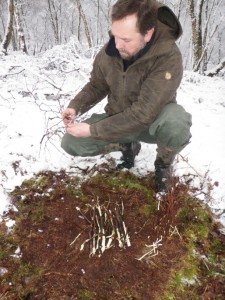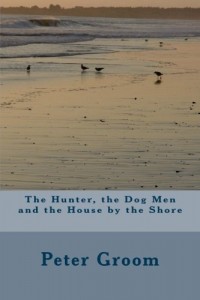To begin with, I have a wide range of interests, including experimental archaeology which provides a fusion between my environmental knowledge, interests in Palaeolithic and Mesolithic archaeology and my fascination in the Prehistoric use of organic materials.
A major recent project for me has been to work on the west coast of Scotland trying to establish how Mesolithic hunter-gatherers were living. I did this by restricting myself to the natural resources and tool kit of a Mesolithic hunter-gatherer so that I could I go through similar thought processes and experiences. Using experimental archaeology and bushcraft skills to fill in some of the gaps in the archaeological record, the human facets that are often missing. Making and testing a wide range of fishing gear, travelling thousands of miles over 4 years and starting to feel like a Mesolithic hunter-gatherer; lugging fishing gear to remote sites, planning to maximise the use of tides, and often experiencing awful weather.
These experiences provided me with an insight into the world of the Prehistoric coastal hunter-gatherer, revealing the extent of organisation and knowledge that they must have had in order to fully utilise their environment. The planning needed to maximise returns, whether foraging, hunting or collecting natural resources.
Experimental archaeology is often used to engage public interest in our past, most notably through reconstruction or experiential learning. With a view to further communicating our understanding of the Mesolithic to a wider audience I recently wrote a novel; The Hunter, The Dog Men and the House by the Shore.
I had three objectives in mind.
Firstly, to illustrate what a fascinating and diverse ecosystem we have lost in the UK since the Mesolithic. With over 30 years’ experience in the environmental sector, I have long been aware of the relationship between human activities, however small, and their environmental consequences. The environmental and ecological knowledge required; the places to find the best materials for a particular task, knowledge of seasons and the seasonal movement of species. When and where to be, at a particular place at a particular time of year. My novel takes the reader on a journey through north-west England (what is now Merseyside, Cheshire and North Staffordshire), 8000 years ago, in a landscape where aurochs, elk, wolf, lynx and wild boar roam.
Secondly, to bring to the modern reader an insight into the daily lives of Mesolithic hunter-gatherers, the food they ate, how they might have cooked it, how they travelled, the tools, the buildings, the boats. The novel is based on the latest archaeological research and is packed full of natural history and bushcraft skills. The main character is a lone Prehistoric hunter who works his way through this diverse and changing landscape. On his travels he encounters a range of characters; from traders to killers and ultimately meets his new mate who lives in a house by the shore.
Thirdly, to demonstrate the extensive skills and knowledge that our ancestors would have employed day in, day out, skills that most people now lack. As an experimental archaeologist I use ancient technologies and bushcraft skills to understand how our ancestors used to live. Some of my projects have included; stone and bone bead making in Romania, tree bast comparisons in Denmark, skin-on-frame boat building, and Neanderthal birch bark tar production. In short, a range of exciting and fascinating projects that have provided me with a genuine insight into the range of skills required by our Prehistoric ancestors.
It is of course very difficult to understand the mind-set of someone who lived 8000 years ago, but by using some of those ancient hunter-gatherer skills together with experimental archaeology, we can move some way toward them.
Peter Groom has a PhD in Mesolithic Archaeology, is a freelance experimental archaeologist and primitive skills/bushcraft practitioner, a founding member of the Mesolithic Resource Group and is the course manager and principal instructor of the Environmental Archaeology and Primitive Skills course at Reaseheath College. He lives in Staffordshire, England.
The novel is available to purchase via Amazon: https://www.amazon.co.uk/Hunter-Dog-Men-House-Shore/dp/153981971X/ref=sr_1_1?ie=UTF8&qid=1478876612&sr=8-1&keywords=The+Hunter%2C+The+Dog+Men+and+the+House+by+the+Shore


